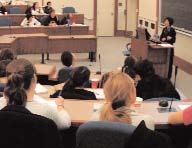Programs & Curriculum
Aspects of the curriculum demonstrate the School’s commitment to evidence-based practice knowledge, values and skills. Such aspects include:
In the first and second semesters, students build the foundation for successful social work careers, focusing on human behavior and the social environment, social policy, practice courses, and the foundation practicum. Students are required to complete the Professional Seminar in the first semester. The second semester introduces social work research. A focus on social work values and ethics and practice with diverse populations is infused throughout the curriculum. In the third and fourth semesters, the advanced concentration curriculum enables in-depth study of one of four social work practice methods and focused study in one of seven fields of practice. The integration of two years of study is demonstrated in a capstone project in the fourth semester. Our comprehensive courses serve as the building blocks for our diverse yet extensive curriculum. Please view the school bulletin for more detailed information. You may also use our Interactive Curriculum Map to view the courses offered for every combination of method and field of practice. |
 Printer Friendly Version
Printer Friendly Version Columbia University’s School of Social Work has an innovative curriculum that is aimed at preparing exemplary professional social workers. It is designed to produce versatile, multi-talented social workers, who can address needs and emerging issues within contexts ranging from individual services to policy innovation, from community organizing to resource development.
Columbia University’s School of Social Work has an innovative curriculum that is aimed at preparing exemplary professional social workers. It is designed to produce versatile, multi-talented social workers, who can address needs and emerging issues within contexts ranging from individual services to policy innovation, from community organizing to resource development.